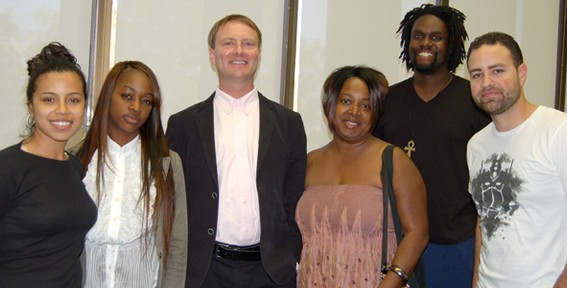
Matt Mutchler, associate professor of sociology and director of the Urban Community Research Center (UCRC) at California State University, Dominguez Hills, has been awarded a nearly $400,000 grant from the National Institutes of Health (NIH) and National Institute of Mental Health (NIMH) to conduct a three-year groundbreaking study exploring how young gay and bi-sexual black men talk about sexual health with their friends.
A collaboration with the Department of Sociology at CSU Dominguez Hills, AIDS Alabama, AIDS Project Los Angeles (where Mutchler directs community-based research), and the University of Alabama, the study aims to better understand how sex talk may influence safer sexual and HIV testing behaviors among young black men who have sex with men (YBMSM), a population that is at high risk for HIV/AIDS infection.
The YBMSM project was borne out of a previous study that Mutchler conducted, “Gay Boy Talk” (GBT), which was the first published research project centered on sexual communication among young gay men and their friends. It was funded by the California HIV/AIDS Research Program. While some research on black gay men and HIV/AIDS has been published, according to Mutchler the current study is unique because it is specifically about sexual communication between YBMSM and their friends.
“We’re always shocked because we do search after search after search, thinking of course someone has published about this because it’s so important,” he said. “But no one has published on even sexual communication between young gay men [in general] and their friends. Nothing…. We know that perceived social norms about things like condom use and HIV testing influences YMBSM’s behaviors, but we need to know much more about how they actually communicate such norms in their day to day conversations with their close friends.”
The reason sexual communication between friends is so critical for young people of a sexual minority, according to Mutchler, is that they may not have access to sexual health information relevant to their lives and because more informed sexual communication can help reduce sexually risky behavior. He hopes the findings will be used to work with YBMSM and their friends to help them communicate more effectively about safe sex topics.
Mutchler said one of the reasons he chose to focus the current study specifically on YBMSM is because, “young black gay men are among the highest risk group for HIV transmission at this time.”
The YBMSM project, which began at the beginning of May, will be concurrent studies in two distinct cultural and geographic regions in the U.S.–Los Angeles and Birmingham, Ala. Mutchler said these are ideal regions for the study because the south-central area of Los Angeles has one of the highest rate of infection in L.A. county, and Birmingham is typical of the geographic region known as the “Deep South” of the U.S. and is also highly impacted. Mutchler added, “The focus on two distinct cultural regions is important because not all black communities are the same; therefore, sexual health and HIV testing programs need culturally relevant information in order to be effective.”
The current study, although covering a specific ethnic group, is more expansive than the GBT study was, Mutchler said, because the team will be conducting more in-depth interviews in each location with a total of 24 YBMSM participants in each region, along with their closest friend, as well as other friends. Trends show those close friends are likely to be other gay males and straight females, but more information is needed about YBMSM’s friendship networks, especially in Birmingham.

Mutchler said this NIH grant award would provide many opportunities for meaningful, hands-on research experience for the university’s faculty and for about 100 students. Some of the more engaged CSU Dominguez Hills students will serve as research assistants, collaborating through regular research team meetings in the sociology UCRC laboratory, as well as through hands-on research workshop classes (SOC 302 and SOC 502) led by Mutchler.
One student, whom both CSU Dominguez Hills and the University of Alabama now have in common, is already on board. Recent graduate Kristie Gordon (Class of ’12, B.S., sociology) had been Mutchler’s research assistant for the past two years as part of the Minority Access to Research Careers (MARC) Undergraduate Student Training in Academic Research (USTAR) program. This fall, she will begin the graduate program at the University of Alabama studying epidemiological criminology (a combination of crime and public health studies), and will serve as a research assistant for the Birmingham component of the YBMSM study, where she will be working as a peer ethnographer.
Seeking to gain insights from insiders and peers, Gordon plans to teach interview techniques to people from places where young black gay men congregate–the same places they will recruit subjects for the study.
“Even though, as a researcher, you get these views and you can get people to open up, there still may be information they may not want to share,” Gordon said, going on to explain that researchers can gain otherwise unobtainable information by having peers collect field notes.
Mutchler hopes the study will help to lead to a better understanding of how young gay black men are talking with their friends about dating, relationships, condoms, substance abuse, HIV testing, diagnoses and treatment, and what are some of the barriers to communication among the group. He said there are statistics that show that among black men there’s more stigma attached to getting tested for HIV, HIV treatment and taking medication, even though they may talk about it, because it’s another issue they have to deal with in addition to being racial/ethnic and sexual minorities.
“We know that if friends are judgmental, for example, it might shut down conversations. We want to know what are the norms being exchanged and the content of these conversations. Do they talk about getting tested and are they encouraging each other to get tested, or are they saying things that are stigmatizing HIV,” said Mutchler. “We initially thought there might be a more positive correlation between talk and safety, but it depends on what that ‘gay boy’ talk is.”
Ultimately, Mutchler hopes that the findings from the study will improve culturally sensitive HIV/AIDS health promotion and testing programs among the YBMSM demographic groups to help in the fight to prevent new HIV infections and lead to more wellness among individuals living with HIV/AIDS.
“We know the sooner people get tested, the sooner they get treatment, the better they’ll do on treatment; also recent studies suggest that being adherent to HIV treatments reduces the chances of transmitting HIV to others… So, treatment is prevention,” said Mutchler, adding that he believes one of the most important influences on whether YBMSM get tested or treated is their conversations with friends.
For more information about this study and for ways to become involved, contact Dr. Mutchler at mmutchler@csudh.edu.